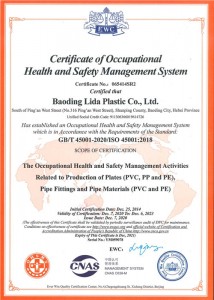Nov . 24, 2024 06:17 Back to list
hdpe conduit pipe
Understanding HDPE Conduit Pipe A Comprehensive Guide
High-Density Polyethylene (HDPE) conduit pipe has emerged as a popular choice in various industries, owing to its robust characteristics, versatility, and cost-effectiveness. This article explores the features, applications, benefits, and installation guidelines for HDPE conduit pipe, making it an essential read for professionals in the field.
What is HDPE Conduit Pipe?
HDPE is a thermoplastic made from petroleum. The material is known for its high strength-to-density ratio, which allows it to withstand substantial pressure and environmental stressors. HDPE conduit pipes, specifically, are tubes designed for the protection of electrical wiring, telecommunications cables, and other utilities. These pipes play an integral role in modern infrastructure, facilitating the underground installation of essential services.
Key Characteristics of HDPE Conduit Pipe
1. Durability HDPE conduit pipes are resistant to impact, corrosion, and chemicals, making them suitable for various environmental conditions. They maintain their structural integrity over time, even when exposed to moisture or aggressive substances.
2. Lightweight Compared to traditional materials such as PVC or metal conduits, HDPE is lighter, facilitating easier handling, transport, and installation.
3. Flexibility The flexibility of HDPE allows for easy bending and shaping, which is particularly advantageous in various underground application scenarios. This reduces the need for multiple fittings and decreases installation time.
4. Non-toxic HDPE is chemically inert, meaning it does not leach harmful substances into the environment, making it safe for use in both residential and industrial applications.
5. Long Lifespan HDPE conduit pipes can last for decades (often over 50 years) when installed correctly, which enhances their cost-effectiveness over time.
Applications of HDPE Conduit Pipe
HDPE conduit pipes find applications in numerous sectors
- Telecommunications They are widely employed for protecting fiber optic cables and other communication lines, ensuring signal integrity and reducing the risk of damage.
- Electrical Electric utilities utilize HDPE conduits for safeguarding power lines, ensuring reliable delivery of electricity
.- Water and Waste Management HDPE pipes are also used in stormwater drainage systems and sewer lines, providing a seamless option that is resistant to corrosion and obstruction.
hdpe conduit pipe

- Industrial In manufacturing and industrial settings, HDPE can be used for various utilities and services, from steam lines to chemical processing.
Benefits of Using HDPE Conduit Pipe
1. Cost-Effectiveness While initial costs might be comparable to other materials, the long-term savings due to durability, low maintenance, and extended lifespan make HDPE a financially sound choice.
2. Environmental Friendliness HDPE is recyclable, contributing to sustainability efforts. Its long service life means reduced material turnover, further benefiting the environment.
3. Ease of Installation The lightweight and flexible nature of HDPE reduces labor costs and installation time, resulting in quicker project completion.
4. Resistance to Environmental Factors HDPE's ability to resist UV rays, moisture, and extreme temperatures makes it highly suitable for outdoor and underground applications.
Installation Guidelines
When installing HDPE conduit pipes, a few best practices should be observed
- Trenching Ensure that trenches are adequately sized and free of sharp objects that could damage the pipes.
- Bend Radius Adhere to the minimum bend radius specified for the conduit type to prevent kinking and enhance durability.
- Connections Use proper fittings and connectors compatible with HDPE to ensure a secure and leak-free installation.
- Backfilling Use suitable materials for backfilling the trench, ensuring no sharp objects come into contact with the conduit pipe.
Conclusion
HDPE conduit pipes represent a modern solution for various infrastructural needs. Their durability, flexibility, and cost-effectiveness make them an invaluable choice for protecting electrical and communication cables. As industries continue to evolve, HDPE will likely play a significant role in facilitating technological advancements and improving the reliability of essential services. Understanding the benefits and installation practices of HDPE conduits can empower professionals to make informed choices that will serve their projects well for years to come.
-
Durable PP Rigid Sheet: Lightweight, Chemical Resistant Solutions
NewsAug.21,2025
-
PVC Grey Sheet for Extraction: Chemical Resistant & Durable
NewsAug.19,2025
-
Durable PVC Pipe Fittings for Plumbing & Irrigation Needs
NewsAug.18,2025
-
HDPE Steel Belt Reinforced Spiral Corrugated Pipe | High Strength
NewsAug.17,2025
-
HDPE Pipe Fittings: Durable, Leak-Proof Solutions
NewsAug.16,2025
-
Premium CPVC Sheet: High-Temp & Chemical Resistant Solutions
NewsAug.15,2025

